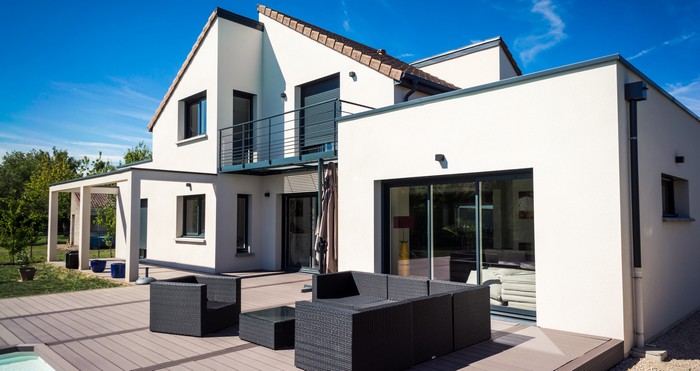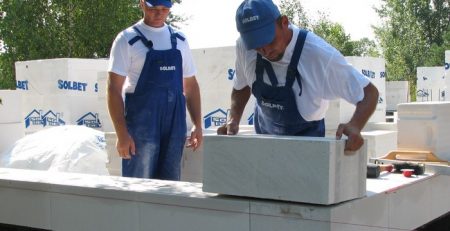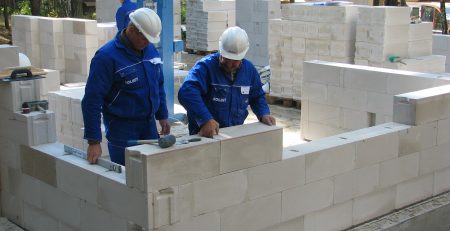A WARM, DURABLE AND HEALTHY HOUSE MADE FROM CELLULAR CONCRETE
Cellular concrete is the warmest material among construction materials. It is also a durable material. Cellular concrete walls do not lose their properties over the years. Buildings built from cellular concrete have been standing for many years and are doing very well.
Cellular concrete is a construction material with properties that significantly affect the construction and use of a building. It reduces the costs not only of building a house that does not require expensive solutions to achieve adequate thermal insulation, but also of building maintenance. This makes cellular concrete the most popular building material for the construction of single-family homes.
WARM CELLULAR CONCRETE WALLS
Cellular concrete owes its very good thermal insulation to its porous structure. The air enclosed in the structure of the material makes up about 80% of its volume, and it is known to be a very good insulator that acts as a heat buffer, insulating the building from heat loss.
SOLBET blocks can be used to build very warm single-layer walls, i.e. without insulation. This can also be achieved by building walls in combination with a layer of polystyrene or mineral wool. Both single-layer and insulated walls meet the requirements for walls in energy-efficient buildings.
For single-layer walls, the best solution is to use 42cm thick SOLBET blocks, which allow the wall to achieve a U-value of 0.20W/(m²-K), i.e. the value achieved by most external walls with a layer of insulation at least ten centimetres thick. This solution ensures high durability, because there is no delicate layer of insulation. The construction of warm single-layer walls made from cellular concrete is also ensured by the exact dimensional accuracy of SOLBET blocks, thanks to which they can be laid with a thin layer of mortar (SOLBET blocks with tongue and groove shaped frontal areas and with mounting brackets are manufactured conforming to the TLMB dimensional tolerance category). A thin joint means mortar thickness of 0.5 to 3mm. In practice it is no more than one millimetre thick, so the joints do not affect the thermal insulation of walls. In other words, the wall is thermally homogeneous, as if it were only made from cellular concrete.
DURABLE CELLULAR CONCRETE WALLS
In spite of its porous structure, cellular concrete is a construction material with compressive strength allowing for the construction of load-bearing walls. Its compressive strength of 2 to 4MPa, depending on the block density, is also sufficient to build solid and durable walls in multi-storey buildings. Cellular concrete is resistant to external factors during construction. Ultimately, it should be protected against weathering by means of plaster, thermal insulating plaster or other type of wall finishing.
The solidity of the structures made from this material is confirmed by the history of cellular concrete, which has been used in construction for almost 100 years.
HEALTHY CELLULAR CONCRETE HOME
If you decide to build a house made from cellular concrete, you can rest easy about the impact of the masonry material on the health of the members of your household. Cellular concrete does not emit any harmful substances, as it is made from raw materials of natural origin that are easily obtained, i.e. sand, water, lime, cement, gypsum. SOLBET blocks are manufactured according to European standard EN 771-4 “Autoclaved aerated concrete masonry units”. The aggregate is quartz sand, so it is free from any admixture of industrial dust and ashes. They also meet the requirements for allowable concentrations of natural radioactive elements, which are lower than in ceramic products. In addition, due to the chemical composition of SOLBET cellular concrete, the blocks are alkaline products, so no microorganisms develop on their surface. The production of SOLBET masonry units is similar to that in other countries, so it is the same product group also offered by other manufacturers throughout Europe and the world.
Cellular concrete has another important advantage: it provides the right microclimate in the building. Thanks to its porous structure, it maintains an optimal indoor temperature as well as air humidity. It can absorb excess humidity from the room and give it back when the air becomes too dry. Its high insulating power creates an effective barrier to thermal energy from the inside. The walls, like wood, are pleasant to the touch and do not emit cold.


